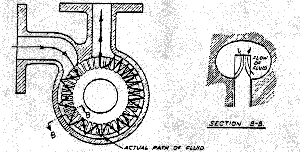In the world of water pumps, there are many different varieties from centrifugal pumps to well pumps and submersible pumps. One of the most useful are peripheral pumps – if you are unsure what these are exactly and what you can use them for, let us explain.
How does a peripheral pump work?
In effect, this pump is a niche product that finds its place somewhere between a displacement and centrifugal pump. Crucial to many applications in today’s industry, the medium is pumped in a peripheral channel when in use, which gives it the name we know it by.
Acting as a type of volume displacer pump when working, the liquid is first sucked through a suction flange and directed into an annular channel. This channel contains the peripheral impeller which rotates and transforms the liquid in a centrifugal motion.
Leaving the pump via the discharge flange after passing through the annular channel, great kinetic energy is imparted onto the liquid via the blades in the impeller.
The difference between side channel and peripheral pumps
If you have ever seen a side channel pump in action, this is fairly similar. The key difference of these from centrifugal pumps is that the curves do not flatten if the flow of liquid slows down. The curves of the pump are straight lines which allows for maximum heads at low flows and low heights at peak flows.
Many applications use these kind of pumps for a variety of reasons now. A great bonus of them is that gases can pass through with no interruption to the liquid flow or chance of bearings being damaged due to dry running. They need very low suction heads and have narrow columns to stop any abrasive material entering. One of the main plus points of peripheral pumps is that their steep Capacity/Head curves are perfect for pressure sensitive systems.
As you can see from the above, the peripheral water pump has many features that recommend it to various applications and projects. Hopefully, this blog post has given you enough information to not only find out more about them but to also consider if they will be the pump you need for your next job.
If you have any questions in regards to a peripheral pump then please don’t hesitate to get in touch with our team of experts by calling 01473 719950
